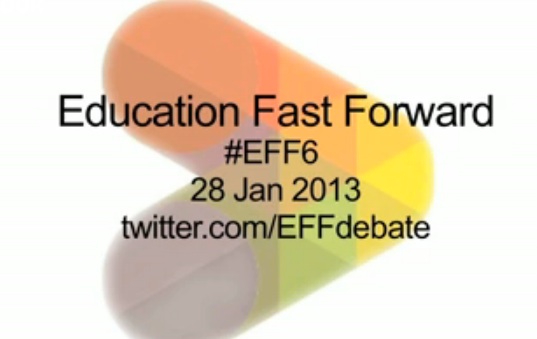Time for Global Learner Voice

Education Fast Forward (#eff6 on Twitter) is a worldwide education and Student Learner Voice movement I’ve been following and sharing with students, educators and administrators. They run regularly scheduled global debates co-moderated by students. The latest debate, #EFF6, takes place January 28, 2012. It will be live streamed 11 a.m. (GMT), so make sure to check your time zone difference. The live video streaming set-ups, by Cisco Education, for students around the world, are amazingly crisp and clear quality. Promethean, a global education company, has been a driving learning force, and has supported Education Fast Forward and Learner Voice from the start.
The great thing about the event is that anyone attending the live streaming can participate through chat and social media. My choice has been Twitter, and I’ve found the organizers extremely responsive in presenting my questions and thoughts to the student and adult panelists. For more on #EFF6, the Education Fast Forward debate, you can download a #EFF6 Agenda PDF and learn about guest presenters, where you can also learn a bit about TakingITGlobal. And if you can’t attend the live video streaming, use the links in this post to check back for the archived event. This experience, live or archived, really is something worth sharing in class with your students, as well as at a faculty meeting—or other education leadership meetings.
Teachers using technology with students need to think globally. By that I mean reference the world, beyond just local, in class practice and daily conversation. Notice that I said “daily” and not just during a specific class or specific geography or citizenship lesson. Along with that, educators should give students what my UK educator colleagues refer to as Learner Voice.
So what is Learner Voice? Well, it’s when learners/students actually take control of their own learning, and help shape that learning. Now, that can be an amazing leap for many educators, especially those who have never taught away from the front of the room, and never relinquished the education stage to students.
Learning should be, after all, not about what the teacher knows and can present—anymore. It is certainly not about what the student can restate from the recitation of the teacher, either. If you ask a student to talk intelligently on topic, today, appropriately, technologically equipped students have a tremendous advantage. As an educator, you don’t have all the knowledge; a textbook or reference book, no matter how recent won’t either. Students get this without us telling them. Educators, who can do this, empower students.
Students know they can get more recent information using a laptop, a tablet, or a smartphone. Teachers know, or should know, that the information they’re getting may not be completely accurate. Now, that’s where the teaching is. I believe it has always been there—since the slate and chalkboard times, but today all educators, and not just the Library Media Specialist, are on point when it comes to helping students interpret digital information.
Students, who at one time, may have completely turned off and tuned out—aren’t. Instead, they continue to seek opportunities to learn—outside the classroom—and in areas not part of a district’s prescribed curricula. Today, these students are becoming a force for education change. Technology makes it possible for students in all parts of the world to band together seeking their Learner Voice. Get your students, staff, and community involved in the debate.
Tools and ideas to transform education. Sign up below.
Ken Royal is a teacher/education and education technology blogger/reporter, video interviewer, podcaster, education event news commentator with 34 years of classroom/school and instructional technology experience. His teaching accomplishments include: 4-time district teacher of the year, Connecticut Middle School Teacher of the Year, and Bill and Melinda Gates award for Technology School of Excellence. Read more of Ken’s work at Royal Reports.
